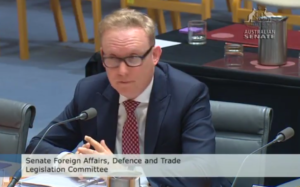The destructive push into Ecuador's rainforests and indigenous communities by several Australian mining giants, with the full support of Austrade, was questioned in the Senate Estimates Committee on Friday. BHP, SolGold, Fortescue, and Newcrest own more hectares of exploratory mining concessions in Ecuador than any other country. Many of these concessions overlap protected forests and indigenous territories, in breach of Ecuador's constitution and environmental laws.

Senator Lee Rhiannon questioned Austrade about its role in promoting Australian mining interests in Ecuador, and whether it even considers environmental protection measures when facilitating the eight-fold increase in mining expected over the next three years. She also queried whether Austrade was underplaying the sovereign risks of operating in Ecuador's politically and culturally sensitive environment.
The risks of operating in Ecuador grew dramatically on Friday, following a court order to suspend the mining operations of Ecugoldmining's controversial Rio Blanco copper mine. Judge Serrano also ordered the “demilitarisation” of the area around the mine, which is currently being guarded by around 150 police and military personnel following heated protests at the mine earlier this month. The city of Cuenca joined the indigenous organisation Ecuarunari in calling for the suspension, in order to assess the damage to water sources caused by the mine.
The senator also highlighted how Austrade could be undoing the conservation efforts of AusAID and the Rainforest Information Centre, which helped establish the incredibly biodiverse Los Cedros Biological reserve several decades ago. Los Cedros is one of 43 Protected Forests and wilderness areas in Ecuador now threatened by mining concessions.“Ecuador has the world's highest biodiversity of vertebrate species and endemic plants, despite being a tiny fraction of the world's land area” said Melbourne Rainforest Action Group (MRAG) Convenor, David Ni Castro.
He went on to note that “the threat of extinction for much of this biodiversity has dramatically increased since April 2016, with the Ecuadorian government opening approximately 2.9 million hectares of land for mining exploration, covering around 14% of the country. The numbers are approximate because the government does not frequently update its website, but we know that concessions have continued to be granted in 2018 too.” “Most of the mining concessions are located in the Tropical Andes Biodiversity Hotspot, the most critically endangered and biodiverse of the 36 ‘hotspots’ worldwide, and home to hundreds of threatened species of mammals, birds, amphibians and plants,” he said. He explains that “around 95% of these mega-diverse forests have already been lost in the north west of Ecuador. To mine the last remaining fragments is simply unacceptable. No company can claim to have a social license to push roads into, and mine, such rare and endangered rainforests”.
He notes that “the mining concessions were made illegally without the knowledge or approval of the people living on these lands, and they cover critical headwater ecosystemsand indigenous territories. They also threaten over a third of Ecuador’s protected forest reserves (Bosques Protectores)” explained MRAG convenor, David Ni Castro.
“As of January 2018, 735,597ha of protected forests in Ecuador are under exploratory mining concessions, or more than 30% of the total land area protected by such reserves” said David Ni Castro. He also noted that “among the largest landholding Indigenous groups, approximately 995,426ha are within mining concessions, or approximately 14% of Indigenous lands in Ecuador. Some groups, like the Awa are more highly affected, with nearly 70% of Awá lands and 50% of Shaur territories affected by mining concessions (or over 860,000 ha of Shaur Amazonian rainforests).”
“The concession process has also been plagued by corruption, ongoing human rights abuses including criminalisation and silencing of dissent, and forced displacement of people whose homelands are jeopardised by mining projects. Corruption has occurred at the highest levels, with even the former Vice President Jorge Glas jailed for six years in December 2017 on corruption related charges,” said David Ni Castro.
"The mining concessions were made illegally without the knowledge or approval of the people living on these lands, and they cover critical headwater ecosystemsand indigenous territories. They also threaten over a third of Ecuador’s protected forest reserves (Bosques Protectores),” explained MRAG convenor, David Ni Castro.
“As of January 2018, 735,597ha of protected forests in Ecuador are under exploratory mining concessions, or more than 30% of the total land area protected by such reserves” said David Ni Castro. He also noted that “among the largest landholding Indigenous groups, approximately 995,426ha are within mining concessions, or approximately 14% of Indigenous lands in Ecuador. Some groups, like the Awa are more highly affected, with nearly 70% of Awá lands and 50% of Shaur territories affected by mining concessions (or over 860,000 ha of Shaur Amazonian rainforests)”.
“The concession process has also been plagued by corruption, ongoing human rights abuses including criminalisation and silencing of dissent, and forced displacement of people whose homelands are jeopardised by mining projects. Corruption has occurred at the highest levels, with even the former Vice President Jorge Glas jailed for six years in December 2017 on corruption related charges,” said David Ni Castro.
“The corruption occurred while he was Coordinating Director for the office of Strategic Sectors. His office was also responsible for promoting and negotiating new mining concessions. Despite his jailing, hundreds of mining concession contracts which his office oversaw, including those with Australian mining companies, are yet to be rescinded,” he said.
“At a referendum in February 2018, 67% of Ecuadorians voted overwhelmingly to roll back mining, particularly in forested areas. Despite this, mining concessions continue to be handed out,” explains David Ni Castro.